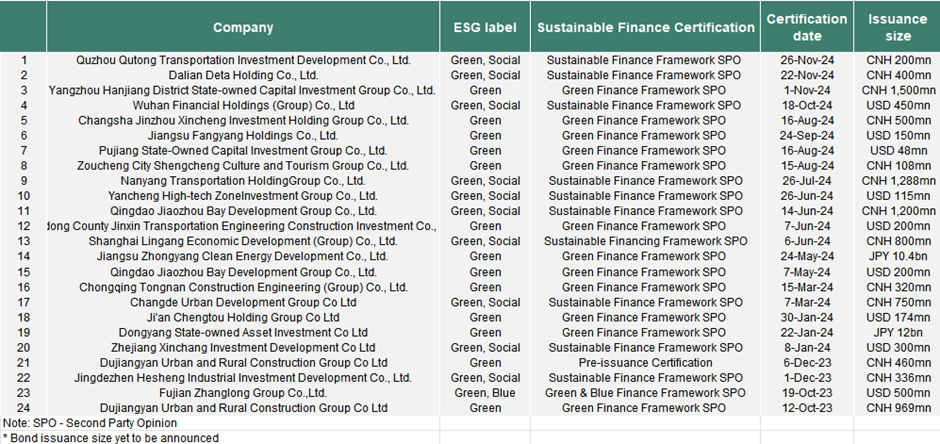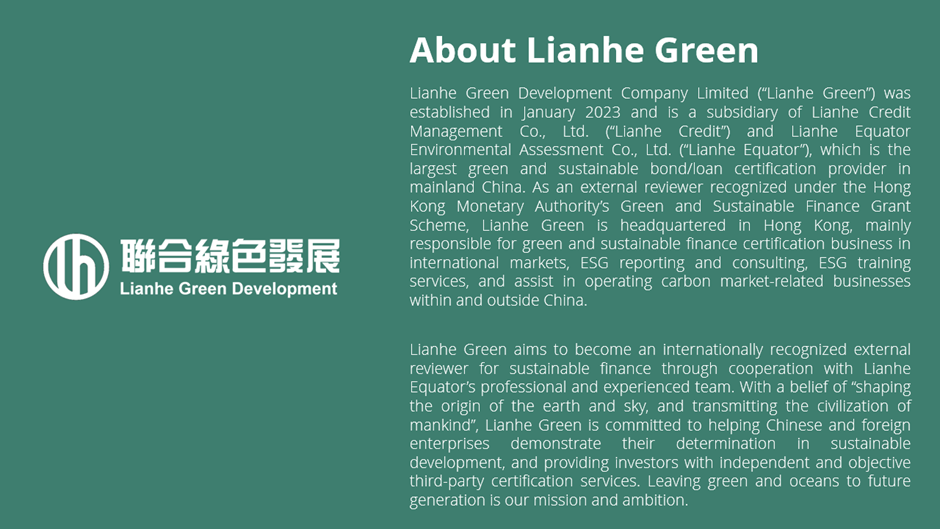 return
return
 current location:Home
current location:Home
 News and Events
News and Events
 News and Events
News and Events
 【ESG News】Global Trends Biweekly Newsletter Issue 24 (2024.12.30-2025.1.12)
【ESG News】Global Trends Biweekly Newsletter Issue 24 (2024.12.30-2025.1.12)
 return
return
 current location:Home
current location:Home
 News and Events
News and Events
 News and Events
News and Events
 【ESG News】Global Trends Biweekly Newsletter Issue 24 (2024.12.30-2025.1.12)
【ESG News】Global Trends Biweekly Newsletter Issue 24 (2024.12.30-2025.1.12)
category:News and EventsRelease time:2025-01-13

Hong Kong China ESG trends
Revised Tentative Issuance Schedule for HKSAR Institutional Government Bonds under Infrastructure Bond Programme and Government Sustainable Bond Programme
The Hong Kong Monetary Authority (HKMA), as representative of the Hong Kong Special Administrative Region Government (HKSAR Government), published (9 January) a revised tentative issuance schedule for institutional Government Bonds (GBs) to be offered under the Infrastructure Bond Programme and Government Sustainable Bond Programme during the period from January to March 2025.
The GBs are denominated in Hong Kong dollars (HKD) and Renminbi (RMB) and will be offered by way of competitive tendering. The revised tentative issuance schedule contains information on, among others, the tentative tenors, tender dates, issuance sizes, issue dates and methods of issuance of individual GB issues. Further details are set out in the Information Memorandum published on the Hong Kong Government Bonds website, https://www.hkgb.gov.hk.
Source: Hong Kong Monetary Authority - Revised Tentative Issuance Schedule for HKSAR Institutional Government Bonds under Infrastructure Bond Programme and Government Sustainable Bond Programme
International ESG trends
EU Platform on Sustainable Finance Unveils Proposals to Simplify, Expand EU Taxonomy
The Platform on Sustainable Finance (PSF), an expert group mandated by the European Commission to advise it on the development of sustainable finance policies, announced the launch of a new consultation on a series of proposed updates to the EU Taxonomy, aimed at simplifying and expanding the classification system for defining sustainable economic activities.
The EU Taxonomy is part of the EU Action Plan on Sustainable Finance, establishing a classification system enabling the categorization of economic activities that play key roles in contributing to at least one of six defined environmental objectives, and that Do No Significant Harm (DNSH) to the other objectives.
According to the PSF, the proposals included in its new draft report follow extensive engagement with stakeholders, and companies in particular, which indicated a need to simplify the application of DNSH criteria, and a push by companies to have their activities included in the Taxonomy.
In light if the engagement feedback, the new proposals “employed a specific focus on the usability of the DNSH criteria” for new activities, with each recommendation including a dedicated section on how usability has been considered, and the PSF also said that it scrutinized Climate Delegated Act DNSH criteria for usability as well. Additionally, the report proposes new Taxonomy activities, including digital solutions and services, and mining and smelting of lithium, nickel and copper.
Source: EU Platform on Sustainable Finance Unveils Proposals to Simplify, Expand EU Taxonomy - ESG Today
The World Weather Attribution (WWA) and Climate Central Jointly Released Annual Report on Climate Risks Titled “When Risks Become Reality: Extreme Weather in 2024.”
The main conclusions of the report are as follows:
(1) Extreme weather has reached new and dangerous levels; (2) Extreme weather events have the potential to cause tens of thousands of deaths; (3) Over the past year, there have been 41 days of extreme high temperatures; (4) The impact of climate change on extreme events has intensified; (5) Global high temperatures have led to frequent heavy rainfall; (6) The Amazon rainforest and the Pantanal wetlands have been severely affected; (7) Hot oceans and warm air are triggering more destructive hurricanes.
The World Weather Attribution suggests that hurricanes triggered by hot oceans and warm air are stronger and bring more precipitation. Climate Central’s research has found that from 2019 to 2023, climate change has intensified the strength of most Atlantic hurricanes. Out of the 38 hurricanes studied in the report, 30 had wind speeds that were one category higher on the Saffir-Simpson Hurricane Wind Scale than hurricanes not affected by human-induced warming. Additionally, with the warming climate, the risk of multiple category 3 to 5 typhoons hitting the Philippines in a single year is increasing.
Source: https://www.worldweatherattribution.org/2024/
Biden Bans New Offshore Drilling Across 625 Million Acres of U.S. Oceans
U.S. President Biden Joe Biden announced today the issuance of new Presidential Memoranda aimed at permanently protecting coastal areas from offshore drilling by prohibiting future oil and natural gas leasing across more than 625 million acres of the U.S. ocean.
In the weeks following the 2024 election, the Biden administration announced a new goal to reduce U.S. greenhouse gas emissions by 61% – 66% by 2035, on a 2005 basis, expressing confidence the U.S.’ ability to achieve the new goal, even in the absence of a climate focus by the federal government, driven by investments put in place over the past four years, and action at the state, local and private level.
A statement issued by President Biden announcing the new orders expressed bipartisan support for the ban on new offshore drilling, citing “Republican and Democratic Governors, Members of Congress, and coastal communities alike” that “called for greater protection of our ocean and coastlines from harms that offshore oil and natural gas drilling can bring.” Biden added that “the relatively minimal fossil fuel potential in the areas I am withdrawing do not justify the environmental, public health, and economic risks that would come from new leasing and drilling.”
Source: https://www.esgtoday.com/biden-bans-new-offshore-drilling-across-625-million-acres-of-u-s-oceans/
Mainland China ESG trends
The “Energy Law of the People’s Republic of China” Has Officially Been Implemented.
The “Energy Law of the People’s Republic of China” officially came into effect on January 1st. The Energy Law consists of nine chapters, which are General Provisions, Energy Planning, Energy Development and Utilization, Energy Market System, Energy Reserves and Emergency, Energy Technology Innovation, Supervision and Administration, Legal Liability, and Supplementary Provisions, totaling 80 articles. The Energy Law clarifies the significance of energy, specifies the entities responsible for the formulation of various levels and types of energy plans, the basis for their formulation, and the requirements for their development. It imposes strict legal responsibilities on energy supply enterprises and improves the system for energy development and utilization. The law also clarifies the direction for adjusting the energy structure, proposes to strengthen the construction of the energy market, and to perfect the energy reserve system and emergency mechanisms. Furthermore, it emphasizes the need to enhance energy technology innovation and supervision.
As a foundational and guiding law, the legislative work on the Energy Law has spanned 18 years, reflecting the strategic orientation and objectives of China’s energy development. It establishes a clean and efficient, diverse and coordinated energy supply and security system, a green and low-carbon energy development system, basic systems for the energy market, and systems for energy technology innovation.
Source: https://www.cnenergynews.cn/news/2025/01/01/detail_20250101193369.html
Ministry of Natural Resources Notice on Further Strengthening the Management of Offshore Wind Power Project Sea Use
Offshore wind power is an important renewable energy industry in China. The development of offshore wind power is of great significance for promoting the adjustment and optimization of the energy structure in coastal areas and helping to achieve the goals of “carbon peak and carbon neutrality.” In recent years, with the rapid development of offshore wind power and the continuous expansion of sea use scale, the developable resources in the nearshore areas of China have become increasingly saturated, and the contradictions in sea use among different industries have become more acute. In order to further strengthen the management of sea use for offshore wind power projects, effectively improve the efficiency of maritime resource utilization, enhance the protection of the marine ecological environment, promote the sustainable and healthy development of the offshore wind power industry, and improve the level of land use control across the entire territory, the following notice is issued in accordance with the “Maritime Area Use Management Law” and relevant regulations.
Source: https://www.gov.cn/zhengce/zhengceku/202501/content_6996439.htm
The National Development and Reform Commission and the National Energy Administration have issued the “Implementation Plan for the Special Action of Optimizing the Regulation Capability of the Power System (2025-2027)”.
To accelerate the implementation of the “Action Plan for Accelerating the Construction of a New Type of Power System (2024-2027)” and the “Guiding Opinions on Strengthening the Construction of Peak Regulation, Energy Storage, and Intelligent Dispatching Capabilities of the Power Grid,” this plan aims to focus on enhancing the regulation capability and utilization level of the power system to support the construction of a new type of power system.
By 2027, the regulation capability of the power system will be significantly improved, with a more refined market environment and business models for the development of various regulation resources, and a further improvement in the utilization mechanisms of these resources. Through the construction and optimization of regulation capabilities, the plan supports the reasonable consumption and utilization of an average annual increase of more than 200 million kilowatts of new energy from 2025 to 2027, with the national new energy utilization rate not lower than 90%.
Source: 202501066a9d8a6e621d495db0ca2ba14196f00f_27e454fc6176bc438ba3a3787b56bb4b95.pdf
Sustainable Finance Certification Public and Completed by Lianhe Green



